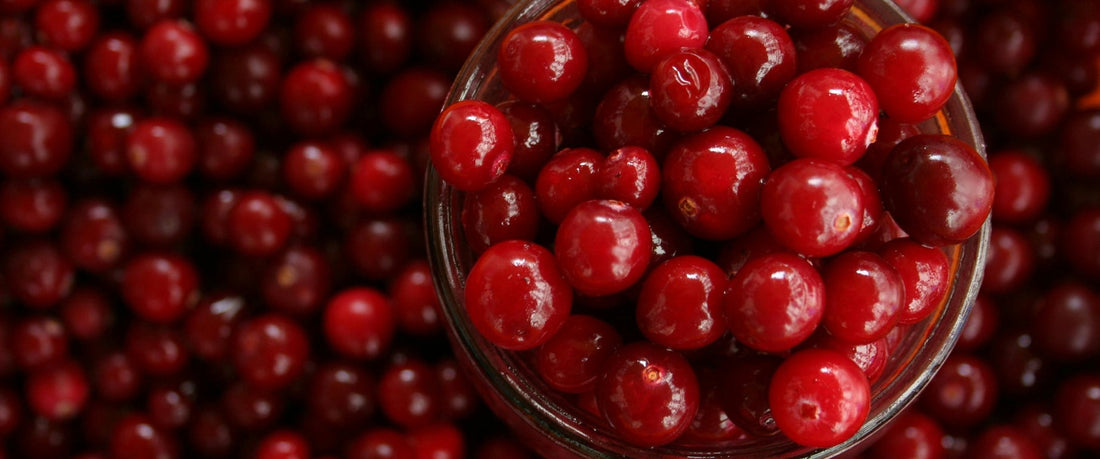
More Than Just a Berry
Cranberries are more than a seasonal fruit — they are a rich source of unique plant compounds that have been studied for their potential to support women’s health.
Among these compounds, proanthocyanidins Type A (PCA-A) have drawn particular scientific interest for their distinctive structure and biological activity.
Unlike the Type B proanthocyanidins found in grapes or cocoa, the Type A linkage in cranberries gives these molecules a unique mode of action that researchers continue to explore.
What Makes Cranberry Extract Unique
Cranberry extract is one of the few natural sources of A-type proanthocyanidins (PCA-A) — a class of polyphenols widely studied for their anti-adhesion properties, meaning they help reduce the adhesion of certain bacteria to epithelial surfaces, particularly in the urinary tract.
Instead of acting like antibiotics, these compounds appear to support the body’s natural cleansing mechanisms by making it harder for unwanted bacteria to attach to delicate mucosal surfaces.
This gentle, non-disruptive mode of support makes cranberry extract among the most widely studied botanicals for supporting urinary comfort and balance.
The Science Behind Its Gentle Support
Beyond their mechanical anti-adhesion effects, cranberry polyphenols have been studied for a broader range of biological activities:
- Antioxidant power: They help neutralize free radicals and support oxidative balance in the body.
- Inflammatory modulation: Preclinical and in vitro models suggest PCA-A may influence pathways such as NF-κB and COX-2, both linked to maintaining the body’s natural response to oxidative stress.
- Microbiome interaction: Emerging human research indicates that these molecules can interact with the gut microbiome, promoting microbial balance and metabolic stability.
Together, these findings highlight cranberry extract as a science-supported ingredient that helps maintain comfort and inner balance.
From Inner Balance to Outer Vitality
The antioxidant activity of cranberry extract may extend beyond internal wellness.
By helping the body manage oxidative stress, PCA-A supports overall cellular health — which in turn may reflect in the skin’s appearance and resilience.
In a small pilot study, a cranberry polyphenol beverage was associated with:
- Improved skin elasticity, and
- Reduced UV-induced redness after six weeks of supplementation.
While preliminary, these findings suggest a possible connection between inner wellness and outer vitality.
When Science Meets Formulation
At BIGVITA, our formulations combine complementary nutrients that work in harmony with the body’s natural systems.
Our Liquid Iron Elixir blends Iron, Cranberry Extract, and Vitamin B6 in a gentle, highly absorbable form:
- Cranberry Extract provides natural polyphenols with antioxidant capacity.
- Iron and Vitamin B6 contribute to normal red-blood-cell formation and energy metabolism.
Together, they form a balanced, science-inspired formula designed to support daily vitality with comfort and care.
What the Evidence Says — and What It Doesn’t
Scientific studies and systematic reviews suggest that cranberry products may help reduce the risk of recurrent urinary tract issues, particularly in women prone to such discomfort.
However, results across studies remain variable, and researchers emphasize that cranberry extract is not a treatment, but rather a supportive nutritional ingredient that works best when combined with hydration, balanced nutrition, and healthy habits.
The U.S. FDA also allows a qualified health claim for certain cranberry products, noting that while evidence indicates possible benefits for recurrent urinary tract health, the data remain limited and inconsistent.
At BIGVITA, we believe in this kind of science — balanced, responsible, and rooted in evidence.
References
1. Howell, A. B., Reed, J. D., Krueger, C. G., Winterbottom, R., Cunningham, D. G., & Leahy, M. (2005). A-type cranberry proanthocyanidins and bacterial anti-adhesion activity. Phytochemistry, 66(18), 2281–2291. https://pubmed.ncbi.nlm.nih.gov/16055161/
2. Howell, A. B., et al. (2010). Dosage effect on uropathogenic E. coli anti-adhesion activity in urine from human subjects after cranberry powder consumption. BMC Infectious Diseases, 10(94). https://bmcinfectdis.biomedcentral.com/articles/10.1186/1471-2334-10-94
3. Blumberg, J. B., Camesano, T. A., Cassidy, A., Kris-Etherton, P., Howell, A., Manach, C., & Vita, J. A. (2013). Cranberries and their bioactive constituents in human health. Advances in Nutrition, 4(6), 618–632. https://www.ncbi.nlm.nih.gov/pmc/articles/PMC3823508/
4. Vostalova, J., et al. (2015). Are high-proanthocyanidin cranberry extracts effective in the prevention of recurrent urinary tract infection? British Journal of Nutrition, 113(2), 321–331. https://pubmed.ncbi.nlm.nih.gov/25400236/
5. Sánchez, P., et al. (2024). Short-term supplementation with cranberry extract modulates gut microbiota composition and metabolite production. npj Biofilms and Microbiomes. https://www.nature.com/articles/s41522-024-00493-w
6. Christman, L., et al. (2024). Six-week cranberry polyphenol supplementation improves skin parameters and modulates skin microbiota in healthy women: a randomized crossover trial. Nutrients, 16(4), 1152. https://www.mdpi.com/2072-6643/16/4/1152
7. Cochrane Database of Systematic Reviews (2023). Cranberries for preventing urinary tract infections. https://pubmed.ncbi.nlm.nih.gov/37068952/
8. U.S. Food and Drug Administration (2020). Qualified Health Claim: Cranberry Products and Urinary Tract Infection Risk. https://www.fda.gov/food/cfsan-constituent-updates/fda-allows-qualified-health-claim-cranberry-products-and-urinary-tract-infection-risk
While emerging data are promising, effects may vary by individual, and more large-scale, long-term studies are needed to confirm benefits across diverse populations.